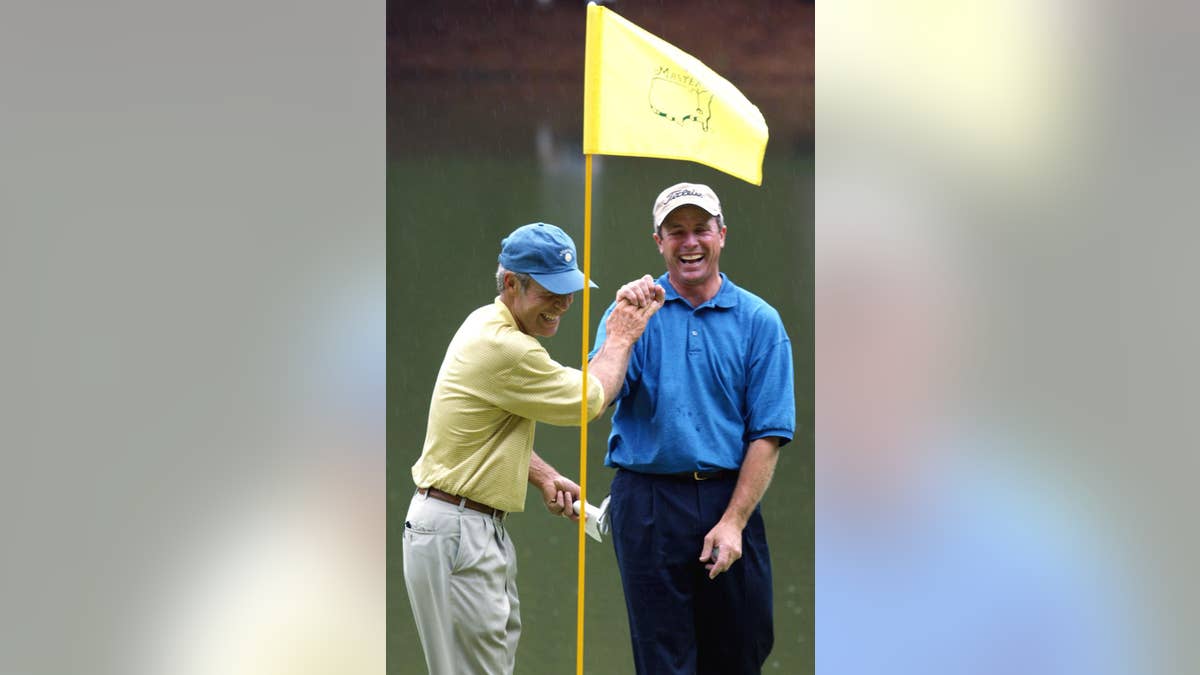
FILE - In this April 10, 2003, file photo, Jerry Pate, right, is all smiles as he is greeted by Ben Crenshaw, left, at the ninth green after sinking the ball for par on a penalty shot from the tee box in the Masters' Par 3 Contest at the Augusta National Golf Club in Augusta, Ga. Augusta National has sent letters to its honorary invitees to inform them that the Par 3 Contest will be limited to players in the field and past Masters champions. U.S. Open, British Open and PGA Championship winners are exempt to the Masters for five years. After that, they become "honorary invitees," along with all past U.S. Amateur champions. Pate is a Pate, a former U.S. Amateur and U.S. Open champion. (AP Photo/Doug Mills, File) (The Associated Press)
AUGUSTA, Ga. – Already the smallest field among majors, the Masters is shrinking the field for the Par 3 Contest.
Augusta National has sent letters to its honorary invitees to inform them that the Par 3 Contest, held on the Wednesday before the opening round, will be limited to players in the field and past Masters champions.
"It's sad," former British Open champion David Duval said. "But I understand it. Maybe there's not enough spots in the Par 3."
U.S. Open, British Open and PGA Championship winners are exempt to the Masters for five years. After that, they become "honorary invitees," along with all past U.S. Amateur champions. For years, that allowed them to be treated like anyone else in the field up until the opening round Thursday.
Now, however, the club is asking that they no longer play practice rounds or use the practice facility.
Augusta National said in an email that honorary invitees still have special access to the Masters, but that the Par 3 Contest will be limited because of increased participation and interest. ESPN has televised the Par 3 Contest since 2008.
"As a person and an honorary invitee, I'm disappointed because it was my favorite day of the year," former British Open champion Ian Baker-Finch said Tuesday. "I loved it. I'll still be there, though, and I'll watch like everyone else."
Baker-Finch played his final Masters in 1996 and has been coming to Augusta National every year since then, either playing in the Par 3 or even playing nine holes of a practice round with Australian players who asked him to join and share tips.
Two-time U.S. Open champion Curtis Strange rarely brings his clubs when he comes to the Masters, and he didn't mind the change in policy.
"We had our time, and now it's their time," Strange said. "I think it's extremely nice that we're invited to come back with your spouse. It's been nice for these guys who want to hit balls and play practice rounds. But times change. I think with time constraints, they want to make it for players in the field. My sense is that the Par 3 was getting a little bit crowded and taking a little bit too long, and they wanted to streamline it. I think that's fine."
The Masters pays homage to major champions more than any of the other majors by giving them special access, which includes two clubhouse badges, a $1,000 honorarium and a gift to commemorate them being there.
The Par 3 course at Augusta National was built in 1958, and Sam Snead won the first Par 3 Contest in 1960. It has been a Wednesday tradition since then, with players often suiting up their children, wives or friends in white coveralls to serve as caddies.
Jack Nicklaus, Gary Player and the late Arnold Palmer up until a few years ago used to play together. Last year, Justin Thomas and Rickie Fowler made a hole-in-one on consecutive shots. Some players have not competed out of superstition — no one has ever won the Par 3 and the Masters in the same year.
The Masters had 89 players in the field a year ago, and it has not exceeded 100 players since 1966.
It was not unusual to see past major champions or U.S. Amateur champions on the range or on the golf course during practice days. A few years ago, two-time Masters champion Ben Crenshaw was playing a practice round with Jerry Pate, a former U.S. Amateur and U.S. Open champion. Crenshaw was putting to various parts of the 16th green to get ready for the tournament. Pate also was hitting several putts, even though he last played the Masters in 1982.
Duval had four good chances to the win the Masters from 1998 through 2001, with runner-up finishes to Mark O'Meara in 1998 and to Tiger Woods in 2001. He now spends most of his time as an analyst for Golf Channel.
Duval said he would have considered playing the Par 3 as an honorary invitee in the future, but not a practice round.
"I would never clog up the golf course when guys are trying to prepare," he said. "That's the problem I would have had."
Rich Beem, the former PGA champion who now works for Sky Sports, said he liked to play the course during a quiet time on Monday to give him a better sense of how it was playing for his TV work. He said he has asked the club if he can at least walk with a group without playing.
The most noticeable difference, however, will be the Par 3.
"I guess it could be easily expanded if they started it earlier," Duval said. "But you have to protect it. You have to protect the competitors."








































